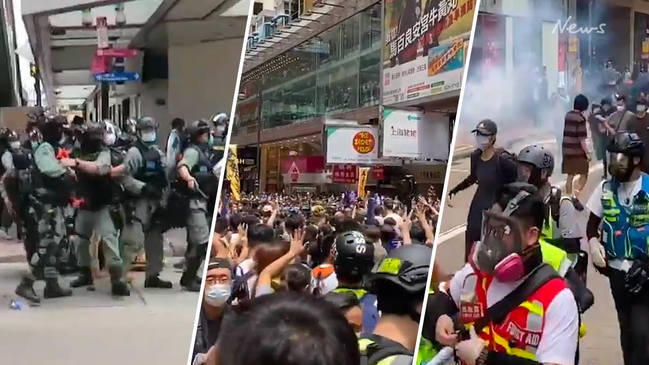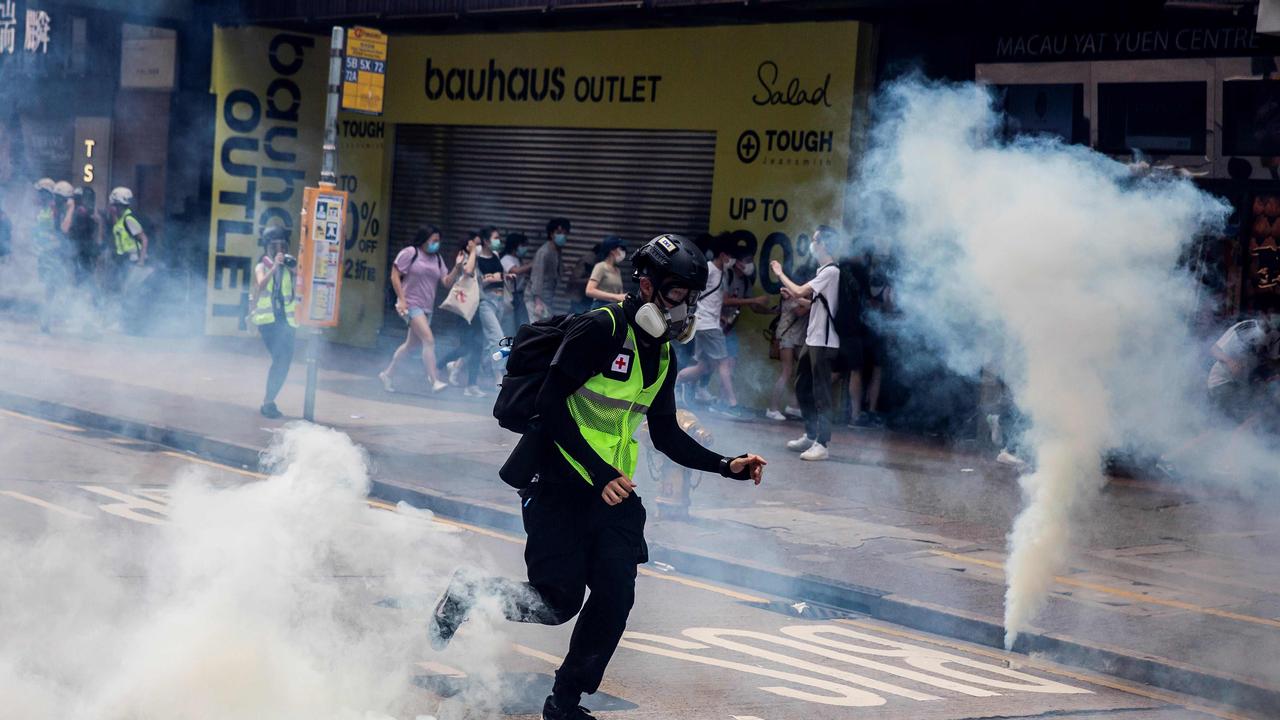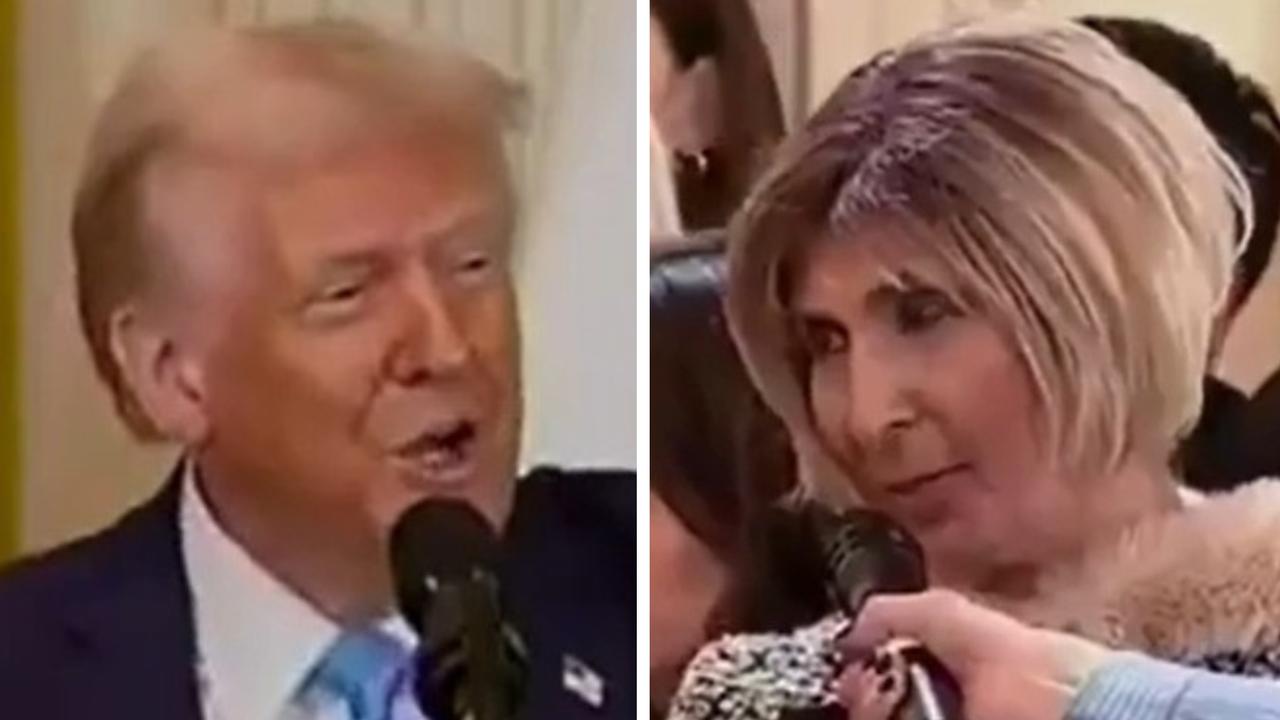Chinese government pushes new law to bring Hong Kong further under its control
China has launched one of its biggest bids for power since the coronavirus pandemic began, leading to massive protests.

Over the weekend, thousands of demonstrators in Hong Kong took to the streets over a controversial new security law put forward by the Chinese government.
The law will allow Chinese national security agencies to deploy in the semi-autonomous territory for the first time, in line with the Chinese Communist Party’s aim to bring Hong Kong more under its control.
If the legislation passes, it could mark the biggest blow to the city’s civil liberties since it was handed over to Chinese authorities in 1997.
RELATED: Coronavirus Australia live updates
RELATED: ‘New epicentre’ for COVID-19 revealed
WHY IS HONG KONG PROTESTING?
Thousands of demonstrators defied social distancing rules in Hong Kong on Sunday, marking the territory’s biggest protest since the COVID-19 pandemic first began.
People rallied over a controversial new national security law that will allow mainland Chinese national security agencies to deploy in Hong Kong for the first time, and is expected to “ban sedition, secession and subversion against Beijing”.
The law is expected to pass through “a rarely used constitutional method” that bypasses Hong Kong’s authorities altogether.
At least 120 people were arrested in Hong Kong on Sunday during the mass protests.
Police used water cannons, tear gas and pepper spray to disperse rallies, who were reportedly throwing objects at them.

These protests come under an umbrella of anti-Chinese resistance by the semi-autonomous territory, which has been ongoing since June last year.
Last year, Hong Kong was rocked by months of massive, often-violent protests, sparked by a Beijing-proposed extradition law that would have seen potential criminals sent to mainland China to face trial.
A coalition of 191 parliamentarians and policymakers from 23 countries issued a statement condemning Beijing.
“It is the genuine grievances of ordinary Hong Kongers that are driving protests. Draconian laws will only escalate the situation further, jeopardising Hong Kong’s future as an open Chinese international city.”
WHAT DOES CHINA HAVE TO SAY?
As the demonstrators and police were facing off in the semi-autonomous financial hub, Chinese Foreign Minister Wang Yi insisted in Beijing that the proposed law must be imposed “without the slightest delay”.
Chinese officials have defended the law as vital to protecting national security after last year’s protests.
“National security is the bedrock underpinning a country’s stability. Safeguarding national security serves the fundamental interests of all Chinese people, including our HK compatriots,” NPC spokesman Zhang Yesui told a news conference in Beijing last week.
Mr Zhang emphasised that Hong Kong was inseparable from China, saying that “in night of new circumstances and need”, it was “highly necessary” for the proposal to go through.
A top pro-Beijing official claimed Saturday that mainland Chinese law enforcement would not operate in the city without “approval” from local authorities.
But there is deep mistrust of China’s opaque legal system in Hong Kong and of how Beijing might use the proposed regulations in the city.
WESTERN POWERS FACE GROWING PRESSURE
The United States now faces further pressure to implement sanctions against the Hong Kong government.
Lowy Institute Research Fellow Ben Bland said the more power China exerts over the territory, the more difficult it will be for Western governments to remain idle.
“As Beijing becomes more brazen about its exertion of power over Hong Kong, it will become more difficult for Western governments to fall back on their standard line that One Country, Two Systems is mostly working well, apart from some blips,” he wrote in Nikkei Asian Review. “Activists and China hawks will push them to justify why they are still treating Hong Kong as a separate customs territory.”
The Trump administration has warned that the US will likely impose sanctions on China if the law passes.
White House National Security Adviser Robert O’Brien said the draft legislation represents a takeover of Hong Kong, which would make it difficult for the city to maintain a “high degree” of autonomy.
“It’s hard to see how Hong Kong could remain the Asian financial centre that it’s become if China takes over,” O’Brien told the NBC.
“Derecognising Hong Kong’s special status would be the nuclear option because it will likely leave Hong Kong even more at Beijing’s mercy,” said Prof Bland. “But at some point, if Beijing keeps telling Hong Kongers that it is calling the shots, the rest of the world will have to confront that fact.”

AUSTRALIA WEIGHS IN
Australia, Canada and the UK have expressed “deep concern” over China’s proposed Hong Kong security laws, which they say will undermine the city’s autonomy.
Foreign Minister Marise Payne joined her counterpart in the UK Dominic Raab, and in Canada Francois-Philippe Champagne, in saying the laws would be contrary to the legally binding Sino-British Joint Declaration of 1984.
“We are deeply concerned at proposals for introducing legislation related to national security in Hong Kong,” the foreign ministers’ statement said.
“The legally binding Joint Declaration, signed by China and the United Kingdom, sets out that Hong Kong will have a high degree of autonomy.”
The ministers said the joint declaration provides that rights and freedoms, including freedoms of the press and of people to assemble and associate, be ensured in Hong Kong law.
The provisions of the UN covenants on human rights also remain in force under the joint declaration.
“Making such a law on Hong Kong’s behalf, without the direct participation of its people, legislature or judiciary, would clearly undermine the principle of ‘One Country, Two Systems’, under which Hong Kong is guaranteed a high degree of autonomy,” the ministers said.
Britain, Australia and Canada have large populations of naturalised Hongkongers, thousands of whom fled the city before its handover to China in 1997, and Hong Kong expatriates.
Pro-democracy activists and politicians in Hong Kong have for years opposed such legislation, arguing it could erode the city’s autonomy.
– With AAP



